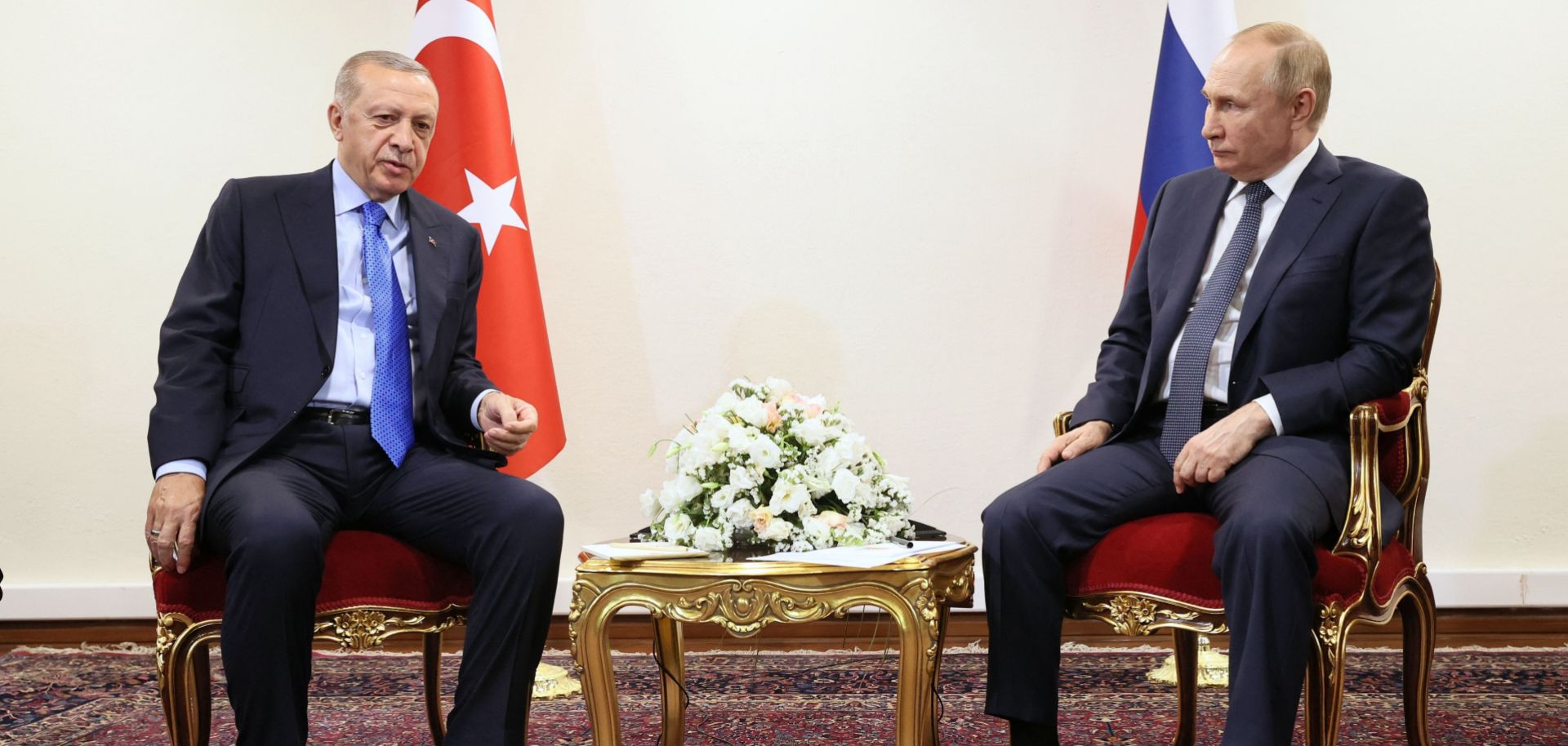The ongoing war in Ukraine is pushing Russia and Turkey closer together, but pitfalls could still derail their deepening ties. On Aug. 5, Russian President Vladimir Putin and Turkish President Recep Tayyip Erdogan met in Sochi for four hours, the second time in a month. The recent meetings between the two leaders reflect the value both Moscow and Ankara place on their bilateral relationship, which has only deepened since the former invaded Ukraine in February. Despite initially condemning the Ukraine invasion, Turkey has so far avoided imposing sanctions or taking any other concrete actions against Russia. This has enabled Ankara and Moscow to not only preserve, but strengthen, their economic and political ties throughout the course of the war.
- During the Aug. 5 meeting in Sochi, Erdogan and Putin agreed to deepen bilateral cooperation in the financial, agriculture, construction, trade and energy sectors.
- In February, Turkey voted in favor of the U.N. resolution condemning Russia’s invasion of Ukraine, which Erdogan called ”unacceptable.” But since then, Ankara has avoided sanctioning Moscow. Turkey has also said it would allow Ukraine-bound Russian warships returning to their registered bases to transit the Bosporus Strait, despite Ankara threatening in February to block such vessels by invoking the provisions of the 1936 Montreux Convention. Turkey has allowed Russian aircraft to fly through its airspace throughout the duration of the conflict in Ukraine as well.
The financial fallout from the Ukraine war is increasing Turkey and Russia’s immediate importance to each other. By forgoing sanctions, Turkey has made itself a key outlet for some Russian capital that can’t go elsewhere. Russia likely views any financial transactions with Turkey as a practical way to move money so long as Ankara remains tightly integrated with Western financial systems. Turkey, for its part, also needs all the foreign currency it can get as it battles its own dire economic crisis at home, which is making Ankara all the more interested in retaining access to the Russian capital. Maintaining economic ties with Russia amid the ongoing Ukraine crisis could theoretically expose Turkey to Western sanctions. However, the political complications of isolating a fellow NATO member will continue to deter the United States and Europe from imposing sanctions on Ankara.
- Russian shipments accounted for 3.9% of Turkey’s total exports in July, up from 2.6% last July. While Europe remains Turkey’s largest trade partner by far, the slight uptick in Russian exports over the past year could indicate the development of a parallel market using Turkish companies as a means of selling to and from Russia.
- Five Turkish banks adopted Russia’s Mir payments system in early August. Turkey also recently agreed to pay for some Russian energy imports in rubles.
- Turkey continues to import large amounts of energy from Russia via pipelines like Turkstream and Blue Stream. Russia provided 45% of Turkey’s natural gas in 2021, underscoring Turkey’s continued dependence on Russian energy.
A Long and Complicated History
Russia and Turkey have oscillated between competing and cooperating in the Middle East, North Africa and Central Asia for centuries. When they were empires, both countries held more territory than they do now. And today, they are each led by presidents who embrace visions of controlling or at least influencing more of that territory they once held. But over the decades, those visions have also periodically come into conflict with one another. Today, Russia and Turkey support opposing sides in both Syria and Libya’s ongoing conflicts. And in the Nagorno-Karabakh conflict, Turkey’s years of arms sales to Azerbaijan collide with Russia’s support to Armenia.
Both Turkey and Russia also benefit from using the other as a source of political leverage. Russia has long lorded its massive military and energy industry, as well as its long history of countering U.S. and European influence, over Turkey. But Russia’s international isolation due to the Ukraine war is now shifting the power dynamic in Turkey’s favor by increasing Ankara’s importance to Moscow. For Russia, increased relations with Turkey can help replace some of the economic and political ties it’s lost to Western sanctions. Turkey’s strong EU ties also grant Anakara the ability to serve as a referee between Russia and its Western adversaries, as evidenced in Turkey’s role in mediating the recent grain export deal between Moscow and Kyiv. In addition, by keeping a friendly government in control of the Bosporus Strait, close ties with Turkey help Russia ensure it retains full access to any new territory in the Black Sea seized during the ongoing war in Ukraine.
- On July 22, Russia and Ukraine signed a deal in Turkey to allow exports of Ukrainian grain from blockaded ports. Turkey’s role in mediating the talks that led to the deal has bolstered Ankara’s prominence on the global stage and also likely indicates a desire by Turkey to potentially mediate future peace talks between Moscow and Kyiv.
- Turkey’s defense procurement agency recently denied claims made by a Russian official that Turkey had requested another Russian S-400 missile system. Turkey’s first purchase of the S-400 system in 2017 prompted the United States to impose sanctions. Ankara’s denial that it is seeking to purchase another such system reflects its strategy of maintaining military cooperation with Moscow while avoiding drawing Western ire.
However, several developments have the potential to disrupt Turkey and Russia’s deepening bilateral relationship, including:
- A new Turkish military operation in northern Syria. For months, Turkey has been threatening to militarily expand its buffer zone along the Syrian border in the hopes of resettling up to 1 million Syrian refugees there and blocking Kurdish militants from entering Turkey. Such a military operation, however, would put Turkish troops close to Russian and Russian-supported forces in northern Syria — raising the risk of a military clash akin to the 2015 fighter jet shootdown incident along the Turkish-Syrian border, which sparked a brief but major diplomatic conflict between Moscow and Ankara.
- Political shifts in Moscow and/or Ankara. The growing influence of the far-right voices in Russia could eventually turn the Kremlin against Turkey, particularly as Turkey deepens its relations with governments in the Caucasus and Central Asia (which Russia has traditionally considered within its sphere of influence), and as Ankara expands its outreach to ethnic Turkic peoples inside Russia itself. Similarly, in Turkey, isolationist political forces could also become more powerful in the coming years — especially if Erdogan’s ruling Justice and Development Party loses ground to less Russia-friendly opposition parties in next year’s general elections.
- Russian losses in Ukraine. If the Russian military suffers further setbacks in Ukraine and looks weak on the global stage, some political forces in Turkey could argue that it stands to gain more from distancing itself from Russia. Similarly, if Russia begins to focus inward or becomes even more distracted by the Ukraine war, Turkey could take advantage by seeking to partially replace Russian influence in the Caucasus and Central Asia, which would, in turn, worsen relations.
- Russian advances in the Black Sea. If, by contrast, Russia were to assume control of significantly more territory along the Black Sea as a result of the Ukraine war, Turkey would likely feel threatened by this encroachment, because it controls the outlet of the Black Sea and depends on it for energy production. This could see Ankara respond by blocking Russian ships from transiting the Bosporus Strait. Turkey could also cut some of its economic ties with Moscow, which are particularly crucial to Russia as it tries to skirt Western sanctions.
- Closer Turkey-NATO ties. If the conflict against Kurdish militants in southeast Turkey escalates or another militant threat grows within Turkish territory, Turkey will likely increasingly lean on NATO for support via arms sales or intelligence sharing. Moreover, if non-Kurdish militants begin to threaten Turkey’s national security, Ankara is also more likely to receive direct support from other NATO countries. Both of these scenarios (but especially the latter) could chafe at Ankara’s close ties with Russia.
Source: Stratfor



